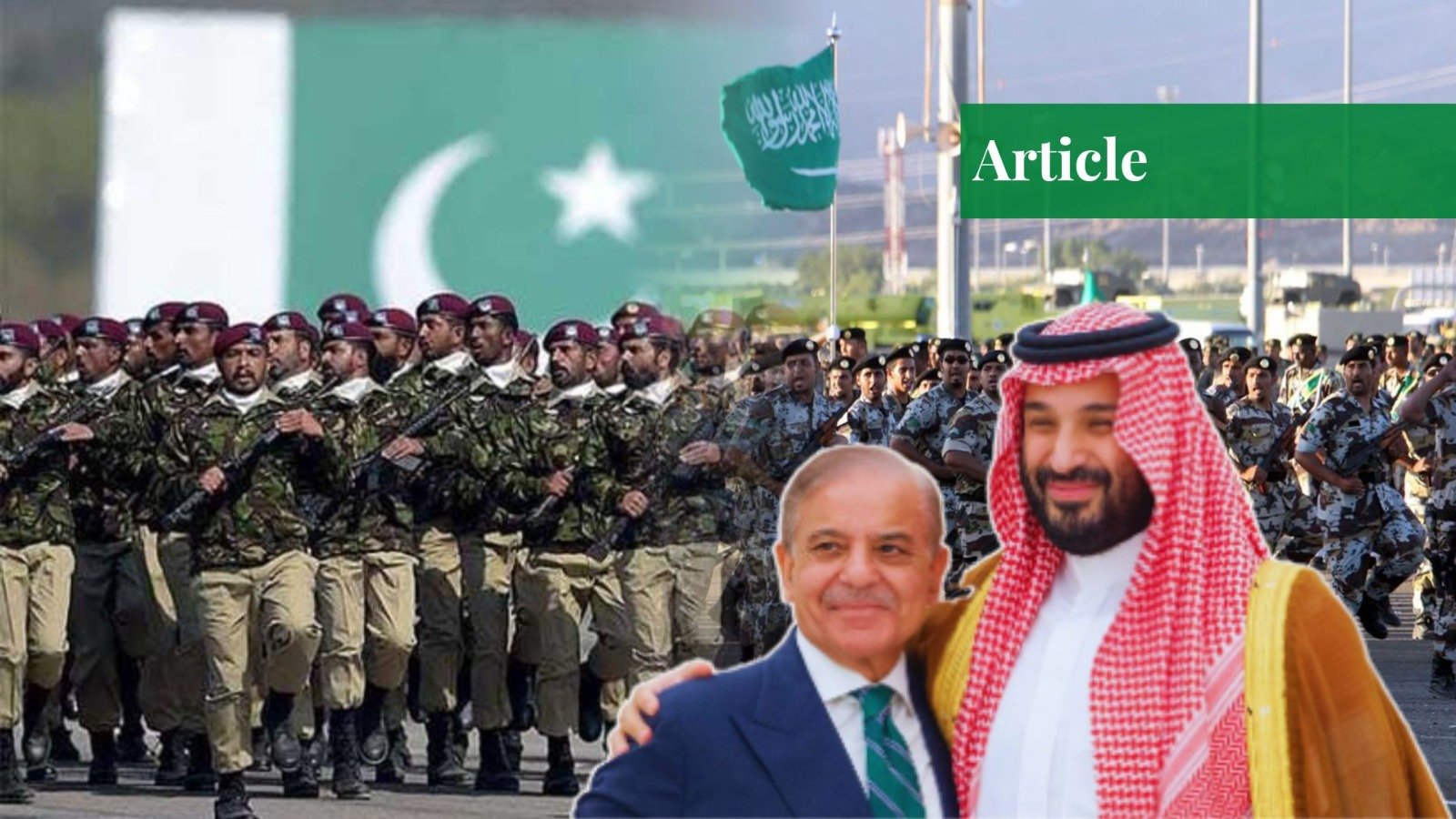The Pak-Saudi Defense pact has rocked the Middle East’s strategic landscape, or so it seems. From the US to India, media outlets have been buzzing with the coverage of this agreement, the actual details of which remain obscure. In the absence of the text of this agreement, the field has been left open to speculation. However, one must remember here that many a time, security-related treaties in the Middle East and even “armies” have lacked any substantiality. So, this Pak-Saudi agreement is one of two things: A bluff or the real deal.
Are Saudi Arabia and Pakistan Bluffing?
Given the history of the Middle East in general and the key actors (Saudi Arabia, Pakistan, and the US) in particular, it is more likely that this agreement is no more than a Saudi strategic bluff in which Pakistan is playing the role of “wing man.” Saudis have tried their utmost to get a formalized security deal with the US, but the US’s unwavering commitment to supporting Israel’s occupation of Palestinian land and genocide has proven an insurmountable hurdle so far.
A Nuclear Umbrella of Deterrence
Israel’s brazen aggression against Qatar has shocked all the Arab countries that look to the US for security. Jolted, Saudi Arabia wants to demonstrate to the US that if it continues to prioritize Israel’s “right to invade” any Arab countries, then it also has the option to operationalize an “Islamic nuclear umbrella.” The announcement of the Pak-Saudi Defense Pact might well be a signal to the US to change its policy of prioritizing its support for unrestricted Israeli aggressions or risk losing its standing as the pre-eminent power in the Arab World.
Concurrently, Saudi Arabia also wants to signal Egypt (its chief rival for leadership in the Arab World) that it cannot aspire to leadership of the Arab World based on its military muscle (the only sphere where Egypt has an advantage over Saudi Arabia) alone. If Saudi Arabia can’t match Egypt in military power, it can bring in an ally that has a proven military record, nuclear weapons, and is completely dependent on Saudi Arabia to keep its moribund economy afloat. It isn’t just a question of leadership either. Egypt might well end up facing an Israeli invasion in the next few months as part of an Israeli plan to complete the genocide in Gaza by displacing its population to a strip of occupied territory on the coast of Sinai. If the Egyptian proposal for the formulation of a military alliance under its leadership had been accepted at Doha, Saudi Arabia, and the other Gulf countries, they might have found themselves involved in a war with Israel, an outcome they want to avoid at all costs.
Pakistan also comes out with many advantages in the “bluff scenario.” If this agreement is nothing more than a diplomatic game, then Pakistan won’t have to deploy any military assets to Saudi Arabia. However, the agreement grants it some strategic clout and buttresses its reputation as a relevant player in the Middle East, at the expense of its arch-rival India. The military-dominated but deeply unpopular Pakistani government also gets an opportunity to play on the conservatism of the Pakistani masses and present itself as a regime that is the guardian of the Muslim Holy cities of Makkah and Medina. This card might prove handy to discredit the opposition at home.
The Real Deal
If this agreement isn’t merely a bluff but the real deal, then it can be expected that some important Pakistani military assets, including but not limited to the Chinese-made J-10 aircraft armed with PL-15 missiles (which proved their superiority over India’s French-made Rafale aircraft during the Indo-Pak conflict in May), nuclear-capable ballistic missiles, and ground-based air defense systems (also Chinese-made) will be deployed in Saudi Arabia in the near future. This would result in seismic shifts in the regional strategic order.
First, it would be an indication that Saudi Arabia has lost all trust in US promises and considers Israel as the primary threat. Second, it would signal Saudi intentions to explore the China option for its security by using Pakistan and its mostly Chinese-supplied military as a bridge. Third, it would elevate Pakistan to the role of the main security provider for wealthy Arab nations at the expense of the US. Fourth, it would signify to India that its economic edge vis-à-vis Pakistan might be blunted with Pakistan getting the support of wealthy backers. This would enable Pakistan to increase its military spending (currently about 1/10th of India’s military spending) significantly and multiply the threat it poses to Indian ambitions of hegemony in South Asia.
Implications of Riyadh and Islamabad Joining Hands
The aforementioned implications of a “real deal” Pak-Saudi Defense Pact have the potential to unite the US, India, and Israel in exerting all their means to destroy it before its operationalization. A politically and economically unstable Pakistan stands as the obvious weakest link in this whole scheme, and it makes sense that it will be the target of US and Indian machinations in this scenario.
Where India can try to preclude any deployment of significant Pakistani military assets to the Middle East by launching attacks on Pakistan as a continuation of its “Operation Sindoor” (which was merely paused by the US-brokered ceasefire in May, if Indian Defense Minister Rajnath Singh is to be believed), the US can take a much subtler and more dangerous approach. It is no secret that the USA only seems to remember its role as the global defender of democracy and human rights when it serves its strategic interests as defined by the philosophy of realpolitik.
So, if the US senses that this Saudi-Pakistan Agreement is an attempt to bypass it and displace it as the security guarantor of the Saudi regime, we will soon see the Pakistani military loaded with US sanctions on the pretext of punishing it for its role in “undermining democracy” in Pakistan. Either by encouraging a palace coup against the incumbent Pakistani Chief of Army Staff (considered by many as the real ruler of Pakistan these days) or by putting its weight behind popular protests against the regime, the US would strive to effect a change of policy (and regime) in Pakistan, leaving Saudi Arabia high and dry. In that case, Saudi Arabia will have no option but to bend the knee and meekly accept the US-Israeli hegemony in the Middle East (with all its genocidal requisites).
If Pakistan has indeed dared to conclude a “real deal” defense agreement with Saudi Arabia, then it has precious little time to preempt the inevitable American response and put its house in order. Fortuitously, Pakistan’s leading opposition leader, Imran Khan, has voiced unambiguous support for the Pak-Saudi Defense Agreement (even though he doesn’t know whether it’s merely a bluff or not) from his jail cell.
The Pakistani Government (and its military backers) must now move with alacrity to reclaim the confidence of the people by meaningfully engaging with Imran Khan and his party and finding an end to the impasse and political instability that has plagued the country for the last three years. Saudi Arabia can offer its good offices for mediation between the regime and opposition in Pakistan as well.
Conclusion
If the Pak-Saudi Defense Pact is merely a bluff, then it will serve to ensure that the Arab response to Israeli aggression and genocide remains disjointed, leaving all Arab States as easy prey. Egypt might find itself the next victim, but Saudi Arabia will inevitably find itself on the receiving end of the Israeli military machine sooner or later.
Pakistan may benefit in the short term from this bluff, but its political and economic instability will remain an Achilles’ heel. On the other hand, if the Pact is the real deal, then Pakistan might find itself in very dangerous and deep waters very soon. However, suppose both Pakistan and Saudi Arabia recognize what needs to be done. In that case, this agreement might herald a new era in which both the Middle East and South Asia see the “Confucian-Islamic connection” (postulated by Samuel Huntington) operationalized against the Israeli war machine and its American patrons.
However, recent events, like the “full support” expressed by both Pakistan and Saudi Arabia for US President Donald Trump’s 20-point peace plan for Palestine, suggest that this agreement is nothing more than a bluff drafted with the backing of the USA. This is an easy assessment to reach, given the short-sightedness and servility that are integral to the leadership of most of the so-called Muslim world in general, and the parties of the Pak-Saudi Security Agreement in particular. It appears that we refuse to learn the lessons of history and are content to keep prostrating before the forces of neo-colonialism and genocide until they completely empty our coffers and then decide to dispose us off in an eerily similar manner to what happened to the states ruled by the “Muluk-at-Tawaif” (Petty Kings) in Islamic Spain.
If you want to submit your articles and/or research papers, please visit the Submissions page.
To stay updated with the latest jobs, CSS news, internships, scholarships, and current affairs articles, join our Community Forum!
The views and opinions expressed in this article/paper are the author’s own and do not necessarily reflect the editorial position of Paradigm Shift.
Dr Hassaan Bokhari is a graduate of Rawalpindi Medical College, Rawalpindi. In 2018-19, he cleared the CSS exam and was 34th in Pakistan. However, he declined to join the civil service in order to pursue his passion for the study and analysis of history more freely. Presently, he is running a YouTube channel "Tareekh aur Tajziya (History and Analysis)" which focuses on the objective analysis of history and current affairs. Dr. Hassaan Bokhari has authored a book titled "Forks in the Road" about the 1971 fratricide and has also headed the India Desk at South Asia Times Islamabad. He aims to play a part in the process of enabling the nation to understand its history in a perspective marked by objectivity, honesty, and confidence.



